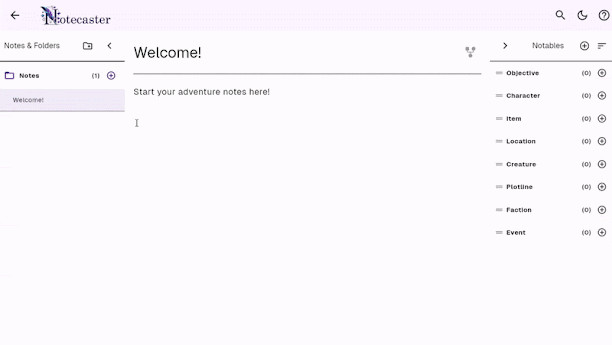Everyone loves good notes. Nobody wants to take them.
This is a truism that resonates far beyond the confines of a conference room. Whether you're in a business meeting, attending a lecture, or deep into a Tabletop Role-Playing Game (TTRPG), the struggle is real. For me, this universal pain point became the foundational pillar of Notecaster's value proposition.
The Notetaking Paradox Solved
Imagine this scenario: you're engrossed in a thrilling TTRPG session. Instead of furiously scribbling, you simply set your phone (using any audio recording app you prefer) in the middle of the table, hit record, and forget about it. Your focus remains entirely on the story, the role-playing, and the unfolding narrative.
Once the session concludes, the magic truly begins. A player simply navigates to Notecaster.app, long-presses the 'Add a new Note' button, selects their audio file, and in about 60 seconds, that recording is automatically transformed into comprehensive session notes.
But here's the critical distinction: these are not simple transcriptions of the entire recording. Notecaster's AI cuts through the noise. It's like having a dedicated scribe at the table, intelligently filtering out the banter, the "walk backs" or corrections, and the lengthy rules discussions. What you're left with is a clean, concise summary of the story and what actually happened in your game.
From Infeasible to In-House: The AI Revolution
This ability to abstract meaning from raw audio is incredibly powerful. Software for transcription has existed for a long time, but adding a layer of sophisticated logic – to discern what information to retain, what to discard, what to summarize into bullet points, and what to keep in long form – has historically been out of reach for all but the most specialized software applications.
What once potentially required an entire software company and years of traditional machine learning progress can now be achieved with a simple API call, buttressed by sophisticated data and prompt engineering. This fundamental shift is precisely why I believe Large Language Models (LLMs) are poised to dramatically impact how we conduct our day-to-day lives.
Things that were technically possible but economically or effort-wise infeasible are now within reach for virtually any software or data team. I believe this accessibility is where we'll witness the most significant mindset shifts and rapid progress.
The Path to Proving AI Value
For AI to gain real traction and prove its worth in applications or the workplace, it needs to adhere to two core principles:
Solve a real, tangible problem. It's not about tech for tech's sake.
Be applied in a way where no other existing tool has successfully delivered a comparable solution. True innovation addresses unmet needs.
While these principles seem straightforward, identifying those "now solvable" problems that were previously out of reach can be challenging.
Teams embarking on this journey will need to think creatively, but also critically acknowledge the current shortcomings of the technology and how to compensate for them. They'll need to stay constantly apprised of the incredibly rapid developments in AI tooling. Crucially, they'll need to know their business and their stakeholders intimately. This last point is vital for two reasons: to genuinely understand the problem space, and to build the trust of the teams who will ultimately be putting these new tools into practice.
Looking ahead, I anticipate a renaissance of teams building custom, in-house solutions. They possess the deepest understanding of their company's unique challenges, and with a focused investment in understanding this technology, they'll be able to create groundbreaking solutions that were simply unthinkable just a few years ago.




Comments
Post a Comment